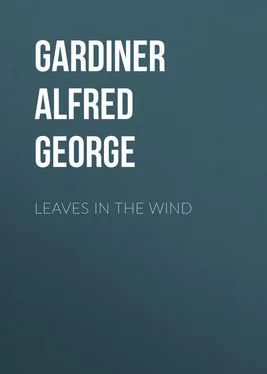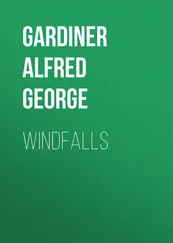Alfred Gardiner - Leaves in the Wind
Здесь есть возможность читать онлайн «Alfred Gardiner - Leaves in the Wind» — ознакомительный отрывок электронной книги совершенно бесплатно, а после прочтения отрывка купить полную версию. В некоторых случаях можно слушать аудио, скачать через торрент в формате fb2 и присутствует краткое содержание. Жанр: История, foreign_antique, foreign_prose, на английском языке. Описание произведения, (предисловие) а так же отзывы посетителей доступны на портале библиотеки ЛибКат.
- Название:Leaves in the Wind
- Автор:
- Жанр:
- Год:неизвестен
- ISBN:нет данных
- Рейтинг книги:5 / 5. Голосов: 1
-
Избранное:Добавить в избранное
- Отзывы:
-
Ваша оценка:
- 100
- 1
- 2
- 3
- 4
- 5
Leaves in the Wind: краткое содержание, описание и аннотация
Предлагаем к чтению аннотацию, описание, краткое содержание или предисловие (зависит от того, что написал сам автор книги «Leaves in the Wind»). Если вы не нашли необходимую информацию о книге — напишите в комментариях, мы постараемся отыскать её.
Leaves in the Wind — читать онлайн ознакомительный отрывок
Ниже представлен текст книги, разбитый по страницам. Система сохранения места последней прочитанной страницы, позволяет с удобством читать онлайн бесплатно книгу «Leaves in the Wind», без необходимости каждый раз заново искать на чём Вы остановились. Поставьте закладку, и сможете в любой момент перейти на страницу, на которой закончили чтение.
Интервал:
Закладка:
The inheritors of unfulfilled renown
Rose from their thrones, built beyond mortal thought
Far in the unapparent.
And it is on the same note that the poem reaches its sublime and prophetic close: —
I am borne darkly, fearfully afar;
Whilst, burning through the inmost veil of heaven,
The soul of Adonais like a star
Beacons from the abode where the eternal are.
The ink of that immortal strain was hardly dry upon the page when the vision was fulfilled, for only a few months elapsed between the death of Keats and the drowning of Shelley, and in the interval the great monody had been written.
I refuse, for the sake of the feelings of Mr. J. M. Robertson and Mr. Foote and the other stern old dogmatists of Rationalism, to deny myself the pleasure of imagining the meeting of Shelley and Keats in the Elysian Fields. If Shelley, "borne darkly, fearfully afar" beyond the confines of reason, could feel that grand assurance, why should I, who dislike the dogmatists of Rationalism as much as the dogmatists of Orthodoxy, deny myself that beautiful solace? I like to think of those passionate spirits in eternal comradeship, pausing in their eager talk to salute deep-browed Homer as, perchance, he passes in grave discourse with the "mighty-mouthed inventor of harmonies." I like to think of Dante meeting Beatrice by some crystal stream, of Lincoln wandering side by side with Lee, of poor Mary Lamb reunited to the mother she loved and whom she slew in one of her fits of insanity, and of an innumerable host of humbler recognitions no less sweet.
But Canon Fleming's name reminds me that all the recognitions will not be agreeable. I cannot imagine that eminent Court preacher showing any eagerness to recognise or be recognised by that other eminent preacher, Dr. Talmage. For it was Talmage's sermon on the wickedness of great cities that Fleming so unblushingly preached and published as his own, simply altering the names of American cities to those of European cities. Some cruel editor printed the two sermons side by side, I think in the old St. James's Gazette , and the poor Canon's excuse only made matters rather worse. The incident did not prevent him securing preferment, and his sermon on "Recognition in Eternity" still goes on selling. But he will not be comfortable when he sees Talmage coming his way across the Elysian Fields. I do not think he will offer him the very unconvincing explanation he offered to the British public. He will make a frank confession and Talmage will no doubt give him absolution. There will be many such awkward meetings. With what emotions of shame, for example, will Charles I. see Strafford approaching. "Not a hair of your head shall be touched by Parliament" was his promise to that instrument of his despotic rule, but when Parliament demanded the head itself he endorsed the verdict that sent Strafford to the scaffold. And I can imagine there will be a little coldness between Cromwell and Charles when they pass, though in the larger understanding of that world Charles, I fancy, will see that he was quite impossible, and that he left the grim old Puritan no other way.
It is this thought of the larger understanding that will come when we have put off the coarse vesture of things that makes this speculation reasonable. That admirable woman, Mrs. Berry, in "Richard Feverel," had the recognitions of eternity in her mind when she declared that widows ought not to remarry. "And to think," she said, "o' two (husbands) claimin' o' me then, it makes me hot all over." Mrs. Berry's mistake was in thinking of Elysium in the terms of earth. It is precisely because we shall have escaped from the encumbering flesh and all the bewilderments of this clumsy world that we cannot merely tolerate the idea, but can find in it a promised explanation of the inexplicable.
It is the same mistake that I find in Mr. Belloc, who, I see from yesterday's paper, has been denouncing the "tomfoolery" of spiritualism, and describing the miracles of Lourdes as "a special providential act designed to convert, change, upset, and disintegrate the materialism of the nineteenth century." I want to see the materialism of the nineteenth century converted, changed, upset and disintegrated, as much as Mr. Belloc does, but I have as little regard for the instrument he trusts in as for the "tomfoolery" of spiritualism. And when he goes on to denounce a Miss Posthlethwaite, a Catholic spiritualist, for having declared that in the next world she found people of all religions and did not find that Mohammedans suffered more than others, I feel that he is as materialistic as Mrs. Berry. He sees heaven in the terms of the troublesome little sectarianisms of the earth, with an ascendancy party in possession, and no non-alcoholic Puritans, Jews, or Mohammedans visible to his august eye. They will all be in another place, and very uncomfortable indeed. He really has not advanced beyond that infantile partisanship satirised, I think, by Swift: —
We are God's chosen few,
All others will be damned.
There is no place in heaven for you,
We can't have heaven crammed.
No, no, Mr. Belloc. The judgments of eternity will not be so vulgar as this, nor the companionship so painfully exclusive. You will not walk the infinite meadows of heaven alone with the sect you adorned on earth. You will find all sorts of people there regardless of the quaint little creeds they professed in the elementary school of life. I am sure you will find Mrs. Berry there, for that simple woman had the root of the true gospel in her. "I think it's al'ays the plan in a dielemma," she said, "to pray God and walk forward." I think it is possible that in the larger atmosphere you will discover that she was a wiser pupil in the elementary school than you were.
ON POCKETS AND THINGS
I suppose most men felt, as I felt, the reasonableness of Mr. Justice Bray's remarks the other day on the preference of women for bags instead of pockets. A case was before him in which a woman had gone into a shop, had put down her satchel containing her money and valuables, turned to pick it up a little later, found it had been stolen, and thereupon brought an action against the owners of the shop for the recovery of her losses. The jury were unsympathetic, found that in the circumstances the woman was responsible, and gave a verdict against her.
Of course the jury were men, all of them prejudiced on this subject of pockets. At a guess I should say that there were not fewer than 150 pockets in that jury-box, and not one satchel . You, madam, may retort that this is only another instance of the scandal of this man-ridden world. Why were there no women in that jury-box? Why are all the decisions of the courts, from the High Court to the coroner's court, left to the judgment of men? Madam, I share your indignation. I would "comb-out" the jury-box. I would send half the jurymen, if not into the trenches, at least to hoe turnips, and fill their places with a row of women. Women are just as capable as men of forming an opinion about facts, they have at least as much time to spare, and their point of view is as essential to justice. What can there be more ridiculous, for example, than a jury of men sitting for a whole day to decide the question of the cut of a gown without a single woman's expert opinion to guide them, or more unjust than to leave an issue between a man and a woman entirely in the hands of men? Yes, certainly madam, I am with you on the general question.
But when we come to the subject of pockets, I am bound to confess that I am with the jury. If I had been on that jury I should have voted with fervour for making the woman responsible for her own loss. If it were possible for women to put their satchels down on counters, or the seats of buses, or any odd place they thought of, and then to make some innocent person responsible because they were stolen, there would be no security for anybody. It would be a travesty of justice – a premium upon recklessness and even fraud. Moreover, people who won't wear pockets deserve to be punished. They ask for trouble and ought not to complain when they get it.
Читать дальшеИнтервал:
Закладка:
Похожие книги на «Leaves in the Wind»
Представляем Вашему вниманию похожие книги на «Leaves in the Wind» списком для выбора. Мы отобрали схожую по названию и смыслу литературу в надежде предоставить читателям больше вариантов отыскать новые, интересные, ещё непрочитанные произведения.
Обсуждение, отзывы о книге «Leaves in the Wind» и просто собственные мнения читателей. Оставьте ваши комментарии, напишите, что Вы думаете о произведении, его смысле или главных героях. Укажите что конкретно понравилось, а что нет, и почему Вы так считаете.












